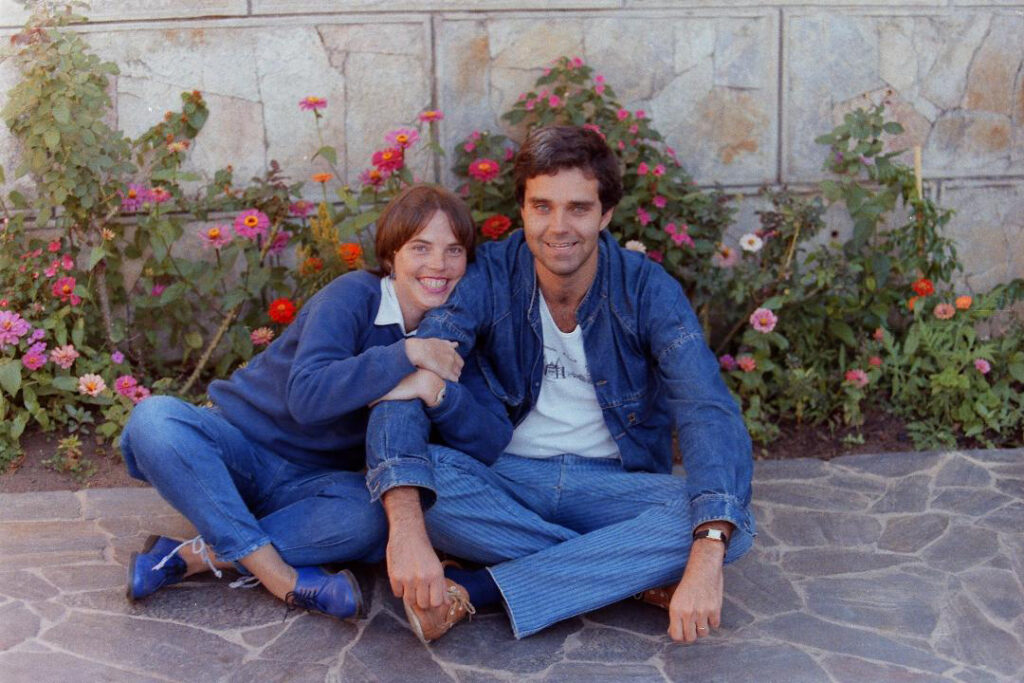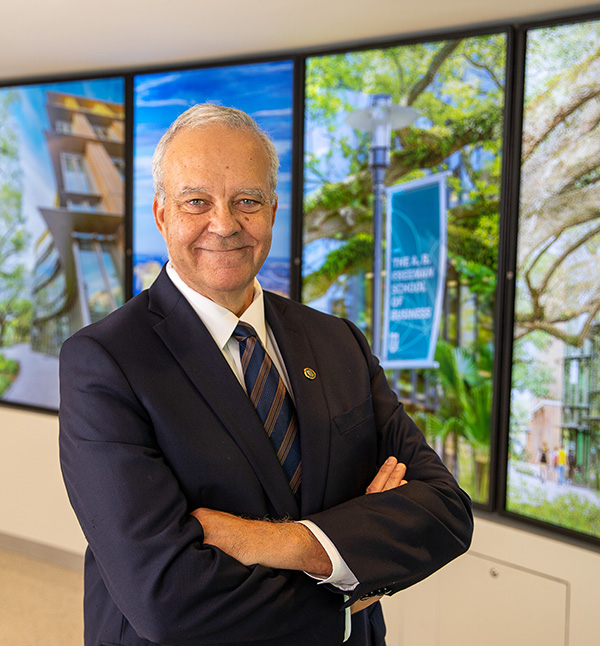
New Dean Paulo Goes says the Freeman School has all the right ingredients to thrive in a fast-changing business education environment, and he’s already working to put those pieces into place.
It was Paulo Goes’ first day in the office as the new dean of the A. B. Freeman School of Business, and he had a problem: His door wouldn’t stay open.
“I asked [Assistant Dean Sharon Moore] to leave the door open when she left my office, but it kept closing,” he recalls with a laugh. “We had to find a doorstop.”
Requesting a doorstop might not sound like a defining act but consider the context: In the three years since the Goldring/Woldenberg Business Complex opened, no one on the dean’s office staff had realized the door needed a stopper. It was usually closed.
“If I’m here, I want people to stop by,” Goes explains. “I don’t want to be hiding. Of course, sometimes I’ll shut the door to have a private conversation, but other than that, I love to have people go by.”
The new open-door policy says a lot about Goes and the style of leadership he hopes to bring to the Freeman School.
“Communication is extremely important,” he says. “Sometimes those serendipitous moments when you run into somebody, that’s how you build the team and get to know people.
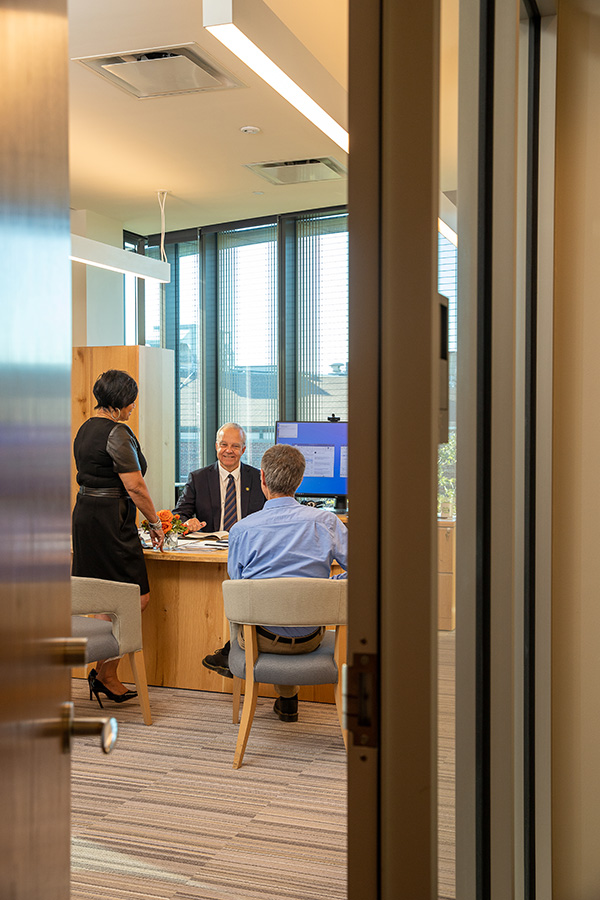
Open Door Policy: Goes chats with Freeman staff in his office in the Goldring/Woldenberg Business Complex.
“I’m a good listener, and I try to use that as a source of information,” he adds. “You can’t just dictate things — ‘This is how it’s going to be done.’ You have to work with people. There’s a bigger impact that comes from working together, and by focusing on that, you’re better equipped to achieve your goals.”
Working together is a recurring theme in conversations with Goes, who began his tenure as dean on Aug. 23. Since then, he’s repeatedly emphasized the importance of organizational culture and building from the bottom up. One of his first acts as dean, in fact, was hosting a Town Hall for faculty and staff to discuss some of the issues affecting Freeman and express his desire to hear their feedback. But that focus on working together isn’t limited to within the school. He’s also stressed the importance of building stronger connections across the university.
“I think business schools need to be more like a connecting hub for the entire campus, because that’s what business does — it connects different disciplines,” he says. “I went on a leadership retreat with the provost at the beginning of the year and saw so much desire to collaborate with the business school — in engineering, entrepreneurship, data analytics. To be successful, there has to be interdisciplinary collaboration.”
Now, with a semester under his belt and a strategic planning process in full swing, Goes says he’s even more confident that Freeman has all the right ingredients to thrive in a fast-changing business education environment, and he’s excited to begin putting those pieces into place.
“There’s opportunity we have to embrace,” Goes says. “It all hinges on bringing people together to move forward and finding ways to fund and support these things. That kind of challenge excites me, and that’s why I’m so happy to be here.”
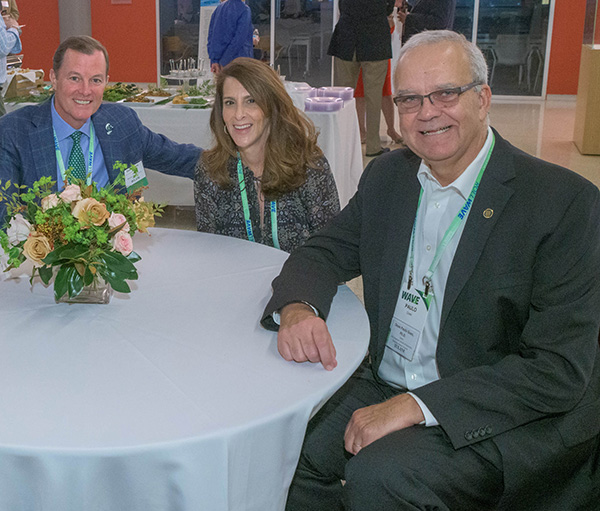
Goes with David Moore (BSM ’87) and his wife, Susan Brophy Moore (BSM ’88), at November’s Graduate Alumni Reunion Party in the Goldring/Woldenberg Business Complex.
ON JUNE 16, 2021, Tulane President Mike Fitts announced that Goes, dean of the University of Arizona’s Eller College of Management, had been named the 14th dean of Tulane University’s A. B. Freeman School of Business.
The announcement capped a six-month national search to find a replacement for Ira Solomon, who had previously announced his intention to step down as dean after serving 10 years in the role.
In an email to the Tulane community, President Fitts and Provost Robin Forman called Goes a preeminent scholar, professor, author, researcher and administrator and a perfect fit for Freeman.
“Paulo has achieved an extraordinary level of success at Arizona, where, as dean, he built nationally recognized
interdisciplinary programs in entrepreneurship and innovation, digital transformation economics and business,” they wrote. “Paulo also rebuilt the school’s fundraising, alumni relations and corporate relations programs, leading to much fundraising success.”
Over the course of a 30-year career in academia, Goes established himself as both a distinguished scholar — he’s a former editor-in-chief of Management Information Systems Quarterly, the top journal in the field — and a savvy and forward thinking administrator with a history of developing innovative programs. During his deanship, he launched successful online programs in healthcare management, accounting, cybersecurity and entrepreneurship, built Eller’s online MBA into a U.S. News & World Report Top 10 program, and established new STEM master’s programs in business analytics and economics.
“I’ve always been interested in building innovative programs, things that can have a real impact,” Goes says. “I get a
lot of satisfaction when things click. I like being the catalyst to move things forward.”
According to former colleagues, Goes has long embraced that role of catalyst and change agent.
“He’s very smart about surrounding himself with people who have the expertise to do what he wants, and then he trusts them to do it without a lot of interference,” says Amy Schmitz, who served under Goes as assistant dean for marketing and communications at Eller College of Management.
“He really gave me free rein to figure out what we needed to do,” adds Phoebe Chalk-Wadsworth, senior director of development and alumni relations at Eller. “If he has people around him with vision, he takes that vision very quickly and says, ‘Okay, how do we make it a reality?’”
Schmitz says Goes also deserves credit for his decision making.
“He’s very reflective, very rational and very calm, which helped a lot when we were facing some critical hurdles,” says Schmitz. “The pandemic was obviously a huge one. Getting us through that as a calm leader was very helpful, especially for our staff. He knows that being transparent and being communicative are key assets to leadership.”
On a personal level, Goes earns praise for his high degree of empathy and understanding.
“He’s one of the most caring people I know,” says Chalk-Wadsworth. “I wasn’t really good at work-life balance, and Paulo would always tell me, ‘Phoebe, you need to take those vacation days’ or ‘You need to stop texting me at strange hours.’ He’s just a very genuine person.”
“He really made an effort to know people personally, not just as employees,” says Schmitz. “He made an effort to socialize and be available. I think that speaks very highly of his relationship building and his ability to connect with people.”
“He’s pretty funny, too,” adds Chalk-Wadsworth. “He was great with alumni and donors.”
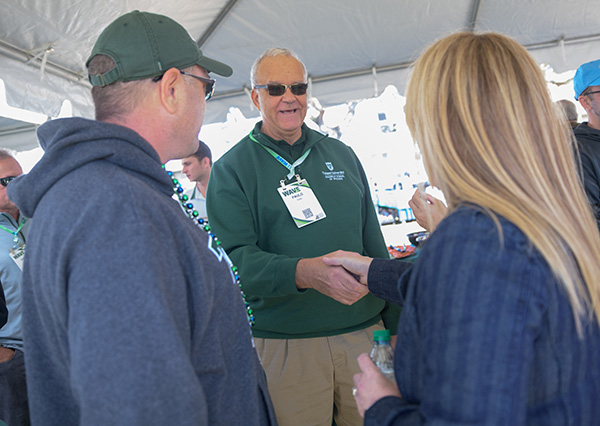
Goes greets alumni at November’s Homecoming tailgate party on the Berger Family Lawn.
GOES WAS BORN in 1956 in Belo Horizonte, Brazil, the industrial center of a rich agricultural and mining region. His father was a civil engineer and entrepreneur, building a successful engineering practice and then purchasing a farm where he raised chickens and grew sugarcane. He later used the sugarcane to develop Sambura, a successful cachaca distillery.
“My dad came from a family of engineers,” Goes says. “I grew up around the idea of engineering and entrepreneurship.”
Goes enjoyed an upper middle-class childhood, attending Catholic schools and eventually enrolling in the Federal University of Minas Gerais in Belo Horizonte, where he earned a bachelor’s degree in civil engineering. After graduation, he worked as an engineer at a firm involved in the construction of a massive steel mill in the state.
“I enjoyed it, but I really enjoyed more the planning process, the logistics, the project management activities,” Goes says. “It also exposed me to computers and the applications that supported those operations.”
Goes pursued those newfound interests at the Federal University of Rio de Janeiro, where he enrolled in an MS program in production engineering. While working on his thesis about improving the quality of hospital care in Brazil, he met an American professor from the University of Rochester who encouraged him to apply to Rochester’s PhD program in computers and information systems.
Goes and his wife, Mara, relocated to Rochester, where he eventually earned both an MS in operations research and a PhD in business administration specializing in computers and information systems. Following his graduation in 1990, he joined the University of Connecticut School of Business as an instructor in operations and information management, becoming one of the first hires of what would eventually become one of the nation’s premier OPIM departments.
It was while teaching at UConn in the early 2000s that Goes helped launch a program that changed the way he looked at business education. The Internet was booming, e-commerce was growing exponentially and the field of data analytics was just starting to emerge. Denis Nayden, chairman and CEO of GE Capital, believed GE needed a new way of thinking to adapt to this changing world, and he thought that new way could come by teaming up with academia. Nayden reached out to Goes and his colleagues at UConn, and the result was edgelab, an applied research lab and accelerator program that put UConn students and faculty to work with GE managers on strategic projects for the company.
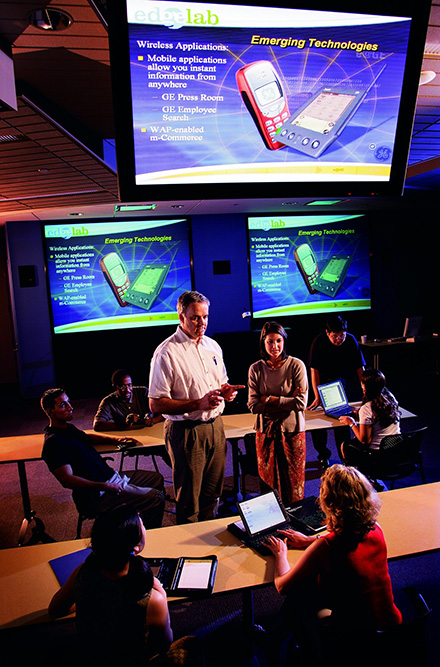
In a 2002 photo, Goes interacts with MBA students in the GE/UConn edgelab, a collaborative partnership he led for UConn from 2000 to 2008. During its run, the program executed over 100 GE projects with a company implementation rate of 97%.
“GE had data on everything, but they didn’t know what to do with it,” Goes explains. “They would bring the datasets to the lab, and our faculty and students would find ways to analyze it and make recommendations. GE Capital was expanding in Europe at the time, so there were a lot of financial- related projects and a lot of risk management projects.”
Goes served as faculty lead on the pioneering initiative, which ran for over a decade and helped place hundreds of UConn graduates in jobs with GE and other firms.
“It was win, win, win,” Goes says of the program. “GE added bandwidth to work on these exciting projects, students got experience they could talk about with potential employers, and the university got a great corporate partnership. It really changed my perspective on business education. It taught me we need to be connected to industry and we need to embrace experiential learning.”
In 2008, Goes accepted an offer to become the Salter Distinguished Professor of Management and Technology and head of the Management Information Systems department at the University of Arizona’s Eller College of Management.
As head of the MIS department, Goes took over an already highly ranked unit and elevated it to even greater heights. Under his stewardship, Eller’s graduate MIS program, undergraduate MIS program and online MIS program each were ranked among the top six in the nation by U.S. News & World Report. He co-founded INSITE, a research center that works with business clients on big-data analytics projects, and led a research faculty that generated more than $85 million in grant funding. He launched or laid the groundwork for new MIS programs including the previously mentioned online MS in management information systems as well as an MS in business analytics and an online MS cybersecurity.
“It was a very exciting time because we had a group that was very solid in terms of research already, doing a lot of the things we talk about today, like artificial intelligence and cyber security,” Goes says. “The department got a lot of grants from the National Science Foundation, there was a lot of innovation, and a lot of companies came out of the department. It was an exciting place to be, and I fit right in.”
When the University of Arizona began a search to replace departed business Dean Len Jessup, UA President Ann Weaver Hart encouraged Goes to apply for the job.
“At the time, I wasn’t thinking about being a dean,” Goes says. “I was still teaching, still helping people with their research, still advising PhD students. I had to think about it. But your professional life is a continuum, and I thought I was ready to do it.”
Goes served as dean of Eller College of Management from 2016 to 2021, a period that saw the college grow its faculty and launch six new degree programs. Goes also introduced a digital innovation thread that runs through the curriculum and raised more than $30 million, including gifts to support the Center for Healthcare Innovation, several endowed chairs and the creation of the Dhaliwal-Reidy School of Accountancy.
Goes wasn’t seeking a new job when a search firm contacted him in April 2021 and asked if he’d be interested in interviewing for a position with the Freeman School, but he quickly became enchanted with the possibility of joining Tulane.
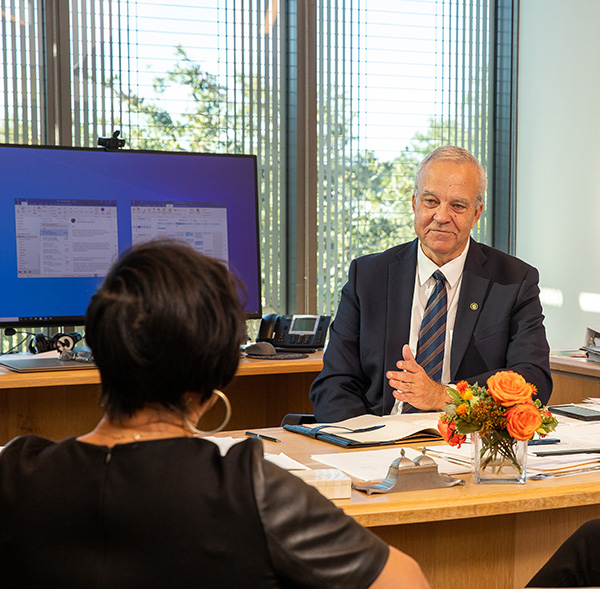
“From the very beginning, from all the interactions I had with Freeman folks, I got a good feeling that there was a match between myself, my experience, my aspirations, my principles and what was going on here,” he says.
In conversations with faculty, staff and alumni, Goes has wryly cited the “three Ps” that attracted him to Tulane: The people, the principles and the potential. He says he was extremely impressed with the people he met during his interviews, he says Tulane’s principles of academic and research excellence and student centricity appealed to him, but most of all he says Freeman’s unique potential struck a chord in him.
“When I looked at Freeman, I thought it had all the ingredients to succeed in the current business environment,” he says. “Freeman values experiential learning — learning by doing — and when things change fast, as they are now, you have to learn by doing and you have to work with industry to bring real world problems to students. Freeman has been doing this for 25 – 30 years.”
He also cites Freeman’s outstanding research faculty, surging undergraduate enrollments, a robust international presence, strong niche areas such as energy and entrepreneurship, and low barriers to collaboration.
“All the ingredients of that third P — potential — are already in place,” he says. “That’s a big part of why I’m here.”
After an unexpected hurdle in the form of Hurricane Ida, which shuttered the university for a month, Goes returned to campus in September to resume his listening tour. In October, he hosted a leadership retreat that brought together key faculty and staff members and identified seven areas of immediate strategic importance to the school: Experiential Learning, the Business Minor Program, Online Programs, the Full-Time MBA Program, Graduate Programs, the PhD Program, and Organizational Excellence. Task forces comprising faculty, staff and students are currently meeting to discuss ways to improve, enhance and expand Freeman’s offering in those critical areas, and their recommendations
are due to Goes by April 1.
Figuring out which of those recommendations to implement — and how to pay for them — will be his next task, but according to Goes, he couldn’t be happier to take on the challenge.
“That’s the fun part,” he laughs. “I’m excited to get started.”
THE PAULO GOES FILE
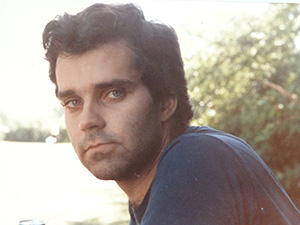 NAME: PAULO GOES
NAME: PAULO GOES
AGE: 65
PREVIOUS EXPERIENCE: DEAN AND HALLE CHAIR IN LEADERSHIP, ELLER COLLEGE OF MANAGEMENT, UNIVERSITY OF ARIZONA
NANCY AND PETER W. SALTER DISTINGUISHED PROFESSOR OF MANAGEMENT AND HEAD, MANAGEMENT INFORMATION SYSTEMS DEPARTMENT, ELLER COLLEGE OF MANAGEMENT, UNIVERSITY OF ARIZONA
GARY GLADSTEIN PROFESSOR OF INFORMATION TECHNOLOGY AND INNOVATION, SCHOOL OF BUSINESS ADMINISTRATION, UNIVERSITY OF CONNECTICUT
BIRTHPLACE: BELO HORIZONTE, BRAZIL
EDUCATION: PHD IN BUSINESS ADMINISTRATION, WILLIAM E . SIMON BUSINESS SCHOOL, UNIVERSITY OF ROCHESTER
MS IN PRODUCTION ENGINEERING, CONCENTRATING IN OPERATIONS RESEARCH, FEDERAL UNIVERSITY OF RIO DE JANEIRO, BRAZIL
BS IN CIVIL ENGINEERING, FEDERAL UNIVERSITY OF MINAS GERAIS, BRAZIL
FAMILY: MARRIED TO MARA SALLES WITH TWO CHILDREN